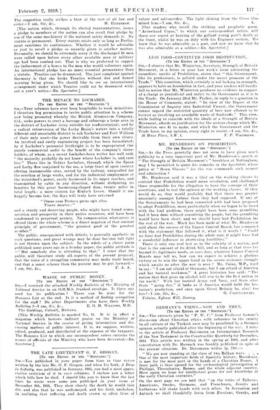THE MENACE TO LOCHABER.
(To THE EDITOR OP THE " SPECTATOR.")
SIR,—Your columns have ever been hospitable to weak minorities. I therefore beg permission to invite public attention to a scheme now being promoted whereby the British Aluminium company, Ltd., seeks powers to erect a barrage and submerge a large area in the district of Lochaber (very suitable for reafforestation), and by a radical retroversion of the Lochy Basin's waters into a totally different and unsuitable district to rob Lochaber and, Fort William of their only asset—the power derivable from their own rivers. An involved and costly engineering project has been formulated; by it Lochaber's perennial birthright is to be expropriated (for purely commercial ends) to the benefit of the company's share- holders, of whom, as a recent Lochaber-born writer has well said, " the majority probably do not know where Lochaber is, and care less." There lies in Nether Lochaber, through which the Spean and Lochy flow conjoined to the sea, a large tract of open country offering innumerable sites, served by the railway, unequalled for the erection of large works, and for the industrial employment of the watershed's power, easily harnessed in its upper reaches, and transmitted by cable in any direction, without disfiguring its beauties by this great boomerang-shaped dam, twenty miles in total length : a mere cistern for Kinloch Leven. Should it un- happily become law, the days will truly have returned " Omne cum Proteus peens egit altos Visere montes : " and a sturdy and deserving people, who might have found remu- neration and prosperity in their native resources, will have been condemned to perpetual penury. No compensation whatsoever is offered them; the whole scheme is a direct negation of that ancient principle of government, " the greatest good of the greatest niimber."
The public, unacquainted with details, is generally apathetic in such questions, and great wrongs may be done because full light is not thrown upon the subject. In the wdrds of a clever poem published some years ago in a Sunday paper, the public attitude is —" But somebody else is attending to that." I trust that the public will therefore study all aspects of the present proposal, that the voice of a struggling community may make itself heard, and that a saner scheme than the present may be put forward.—


































 Previous page
Previous page